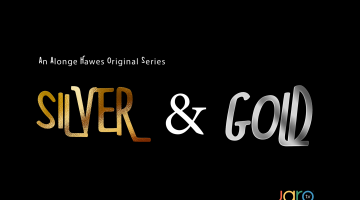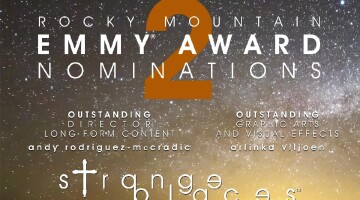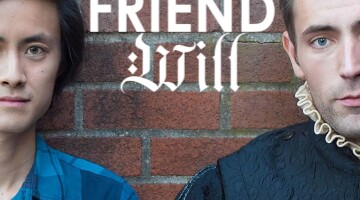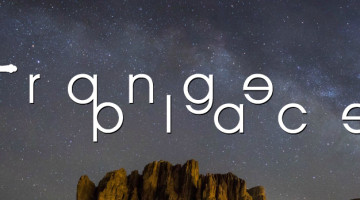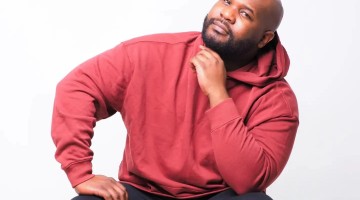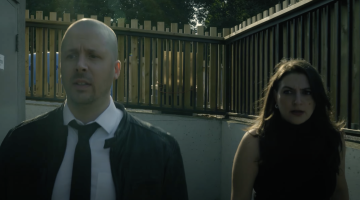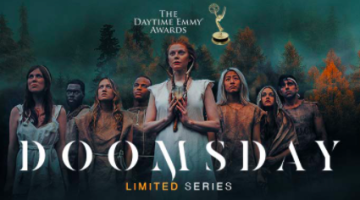The sacred bond between a business and its customers is frequently tested, but the intimate bonds that sustain a family-owned enterprise can also face some amusing challenges. When two formerly tight childhood friends unexpectedly end up inheriting their fathers’ small New York pest control company in the first season of YOU’RE THE PEST, they get more than just creepy little insects and rodents to stress about.
In its first 7 episodes, YOU’RE THE PEST looks at the tenuous give-and-take between ex-beauty queen Marissa Morales (Adriana DeGirolami, FX’s SNOWFALL) and might-have-been cop Alex O’Malley (played by series creator Taylor Coriell). Both Marissa and Alex instantly take the reins of a fledgling pest extermination operation. On and off the job, though, their love-hate relationship shows.
With their business in urgent need of new customers, Marissa and Alex decide to bring aboard two extremely ambitious interns: Derek (Kevin Sebastian, PRODUCING JULIET) and Stuart (Aaron Gold). Though Derek and Stuart appear to be on Marissa and Alex’s side, the two interns have some wicked motivations behind their decision to work for the company.
Hoping to ease Marissa and Alex’s concerns about the business is their wacky attorney (Parisa Fitz-Henley), while Marissa’s teenage brother Max (Jeremy C. Fernandez) is a welcome presence in his older sister’s life. Whenever Marissa and Alex feel like the profession of pest control seems as challenging as fighting off a swarm of bees, their bartender (Chantal Maurice) gives them a much-needed reality check about their situation.

L-R: YOU’RE THE PEST co-stars Adriana DeGirolami and Taylor Coriell (who created the series).
YOU’RE THE PEST’s seventh episode wrapped up its first season on May 30th, but the making of the series was a years-long undertaking that started when Coriell initially worked out the show’s concept.
The series’ pilot was produced in 2015, and the six episodes that preceded it were shot last December in Astoria, New York in only 10 days.
As a late entrant in the 2015 Big Vision, Empty Wallet Kickstart Diversity web series program, YOU’RE THE PEST is a series where, thanks to Coriell, people from all social backgrounds could benefit by their participation in its production. With equal opportunities and diversity as necessary in filmmaking as ever, Coriell explains how her series represents the creative and professional benefits of inclusivity in the entertainment industry.
SR: What was the production process like?
Taylor Coriell: The rest of season 1 was originally 7 more episodes (that we’ve condensed into 6 in post). We had to shoot it before Adri started with SNOWFALL out in L.A. in January, so we all more-or-less coordinated schedules for her to fly out for ten days last December (2017). We settled on those ten days because the pest control company (Standard Pest Management in Astoria) that we shot in was very generously letting us use their space for two consecutive weekends, so those bookended the shoot.
Then we had a couple locations to shoot in, so we scheduled basically three days of run-and-guns during the week in between. So we shot six episodes in seven out of ten days. Sounds like a lot, and it was. In some ways, I obviously wish we’d had more time, but I think the fun of shoots like this is the creative thinking it takes to problem solve, get the shot, and tell the story.
It was also a blessing that Adri and I had not only worked together as actors on the pilot before, but also as creative partners on a few other projects since then, so we had a good sense of each other’s rhythm. We also lucked into a rehearsal with Kevin and Aaron before we got them on set, so we had a chance to all find that rhythm together as well.

Part of the YOU’RE THE PEST production crew. L-R: first assistant camera Jonathan Paredes, cinematographer Monika Kolodziej, co-producer/production designer/composer Cameron Perry and director Adrienne Lovette.
SR: YOU’RE THE PEST has committed itself to emphasizing diversity – not just in providing opportunities for cast and crew from ethnically diverse backgrounds, but also in the way it tells its stories. Talk about the ways you’re meeting that commitment through the series itself, and in every aspect of its production
Coriell: Great question. I think it goes without saying that this is a pretty hot topic right now, but when Jasmine (Romero, co-writer of YOU’RE THE PEST) and I started writing the show in 2014, there were not nearly as many headlines like the ones we see now. I am so happy that the general consensus in 2018 is that the best way to tell different stories is by making sure that the people in charge of telling them are different than those who have had ample opportunity for their voices to be heard before.
I’m proud to say that we have an extremely healthy mix of women, POC’s (people of color), and members of the LGBTQ community – not only on our team, but in key leadership positions. I daresay we’ve made a place for anyone we can think of at the table, and if we missed out somewhere, we’d happily pull up a chair. Committing to it so hard has been extremely rewarding. In casting, we made such an effort to find people who truly fit the roles that Jasmine and I wrote, and meeting those people at auditions was such a treat.
I specifically remember casting the role of the Blind Person (played by the velvet voiced Frank Senior) because each of the actors we brought in for the role said that this exact scene had happened to them many times (see episode 2). And that’s just one of many anecdotes we have from every aspect of the creation of the show.
People really raised their hands and contributed opinions, sometimes challenging things that Jasmine and I has written and forcing us to break out of some of our preconceived notions as well. Also, I remember when I first started pitching the show to people and raising money for it, barely anyone I talked to had heard of the Bechdel test, but it was such an important part of the story that Jasmine and I wanted to tell. I’m proud that that show passes with flying colors.
But not only am I proud that we managed to write an entire season of a show where the two twenty-something main female characters are more interested in figuring out how to run their own company than in their romantic relationships, I’m extremely excited that not one single audience member has asked me why neither Alex or Marissa has any sort of romantic interest.
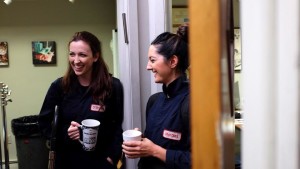 It may be a very small sample, but I think it shows that there is an audience out there, hungry for new representation.
It may be a very small sample, but I think it shows that there is an audience out there, hungry for new representation.
It encourages me to continue writing stories about the people I know—- women who worry about their families, who strive to succeed in their career, and who want to find the best version of themselves, by themselves. I hope it speaks to other female creators as well and makes them want to write stories that are different.
SR: In 2015, the series also became part of the Big Vision, Empty Wallet’s Kickstart Diversity program. Describe how your alliance with that program has benefitted both the series, your work as filmmakers, and your efforts to emphasize diversity in all aspects of the show’s production.
Coriell: We were very fortunate to be one of the last web series to be accepted into Big Vision, Empty Wallet’s Kickstart Diversity program in 2015, before (the program’s founders) Alex Cirillo and Dani Faith Leonard started their Fellows program. It definitely encouraged me to keep going in the beginning. because obviously someone out there cared about our efforts to make a change, and they were willing to help. It’s provided me with a group of likeminded creators to reach out to, as well as workshops and other resources to make wading through the sometimes confusing and ever-changing market of episodic content a little easier.
SR: Based on your experience making YOU’RE THE PEST, what advice do you have for filmmakers who want to accomplish the goal of making content with diverse casts and crews?
Coriell: Know your “why”. Season 1 of You’re The Pest has taken me a very long time, a lot of hours, a lot of blood, sweat, and tears. I think that when audiences see themselves and the people they know reflected truthfully onscreen, it expands their world and changes what is possible for them to dream of and achieve.
For me, I want my nieces to know that it’s okay to like glittery pink shoes and aspire to be a badass police officer, and that it’s also okay to like playing with trucks in the mud, and want to be Miss America. Once you know your “why”, don’t compromise on that commitment. Just do it. It is possible. The actors will come, the crew will come, the money will come, and when they do, you’ll not only have expanded your world, you’ll be expanding theirs too.
Creatives who want to make the television landscape a more diverse place are out there; we just have to find each other, and by working hard to take this first step to make sure more people are accurately represented on screen, I truly think you’ll be helping make the world a more understanding, inclusive place.
SR: What are your overall hopes for the show’s success?
Coriell: We created a very rich world for Alex and Marissa, one that I would like to see have a life beyond one season. My goal for the show has always been to find the show’s audience and for that audience to hopefully be large enough to merit a second season, third season, fourth season, etc. It would also be very cool to develop it into a longer, more traditional TV comedy format, which I’m very prepared to do. We are making the rounds of festival submissions right now as well, so fingers crossed we’ll be traveling soon!
(NOTE: On the possibility of closed-captioning YOU’RE THE PEST, Coriell says it may become part of the series’ episodes once post-production concludes.)
YOUTUBE: https://www.youtube.com/channel/UCxeddvSykdzU2lzfNNQ_GGQ
FACEBOOK: https://www.facebook.com/yourethepestseries/
TWITTER: https://twitter.com/yourethepest
INSTAGRAM: https://www.instagram.com/yourethepestseries/

